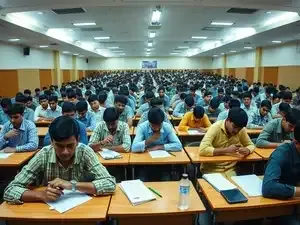The Uttar Pradesh government has implemented a comprehensive strategy involving advanced technology, strict confidentiality protocols, and robust administrative oversight to ensure fair and transparent conduct of the Review Officer/Assistant Review Officer (RO/ARO) exam on July 27.
The examination will be conducted in a single shift from 9:30 am to 12:30 pm across all 75 districts of the state. The government has roped in the state public service commission to implement the strategy.
According to a statement, exam monitoring will be carried out through a combination of artificial intelligence, CCTV surveillance, and social media tracking to eliminate the risk of malpractice, paper leaks, or any form of misconduct.
While candidate identification and centre allocation have been fully digitised to ensure transparency and eliminate potential bias, each district magistrate will serve as the nodal officer, empowered to oversee the entire examination process and take immediate action when necessary.
A total of 2,382 exam centres have been established to accommodate over 10.76 lakh candidates.
The exam centres have been assigned through a computer-generated randomisation process, and e-admit cards are linked to an eight-step verification system under the One Time Registration (OTR) process.
To maintain strict confidentiality, question papers have been prepared in two separate sets by different printers. Just 45 minutes before the exam, a computer-based randomisation process will determine which set is used.
Each question paper will be available in eight jumbled series, each marked with a unique and variable barcode. These papers will be securely stored in confidential trunk boxes with triple-locking mechanisms and five-layer tamper-proof packaging.
This entire process will be monitored through live CCTV streaming at the centre, district, and commission levels, the statement said.
Entry into exam centres will require biometric authentication and facial recognition. Dual-layer frisking will be conducted jointly by the police and the implementing agency.
To ensure rigorous supervision at each exam centre, a team consisting of a sector magistrate, a static magistrate, a centre administrator, two deputy centre administrators, and trained invigilators will be deployed.
The centre administrator will appoint half of the invigilators, while the district magistrate or district school inspector will assign the other half.
Invigilator duties will also be determined through computer randomisation to ensure impartiality. A dedicated social media monitoring cell has been established to track and respond swiftly to any rumours, leaks, or suspicious online activity.
The examination will be conducted in a single shift from 9:30 am to 12:30 pm across all 75 districts of the state. The government has roped in the state public service commission to implement the strategy.
According to a statement, exam monitoring will be carried out through a combination of artificial intelligence, CCTV surveillance, and social media tracking to eliminate the risk of malpractice, paper leaks, or any form of misconduct.
While candidate identification and centre allocation have been fully digitised to ensure transparency and eliminate potential bias, each district magistrate will serve as the nodal officer, empowered to oversee the entire examination process and take immediate action when necessary.
A total of 2,382 exam centres have been established to accommodate over 10.76 lakh candidates.
The exam centres have been assigned through a computer-generated randomisation process, and e-admit cards are linked to an eight-step verification system under the One Time Registration (OTR) process.
To maintain strict confidentiality, question papers have been prepared in two separate sets by different printers. Just 45 minutes before the exam, a computer-based randomisation process will determine which set is used.
Each question paper will be available in eight jumbled series, each marked with a unique and variable barcode. These papers will be securely stored in confidential trunk boxes with triple-locking mechanisms and five-layer tamper-proof packaging.
This entire process will be monitored through live CCTV streaming at the centre, district, and commission levels, the statement said.
Entry into exam centres will require biometric authentication and facial recognition. Dual-layer frisking will be conducted jointly by the police and the implementing agency.
To ensure rigorous supervision at each exam centre, a team consisting of a sector magistrate, a static magistrate, a centre administrator, two deputy centre administrators, and trained invigilators will be deployed.
The centre administrator will appoint half of the invigilators, while the district magistrate or district school inspector will assign the other half.
Invigilator duties will also be determined through computer randomisation to ensure impartiality. A dedicated social media monitoring cell has been established to track and respond swiftly to any rumours, leaks, or suspicious online activity.








